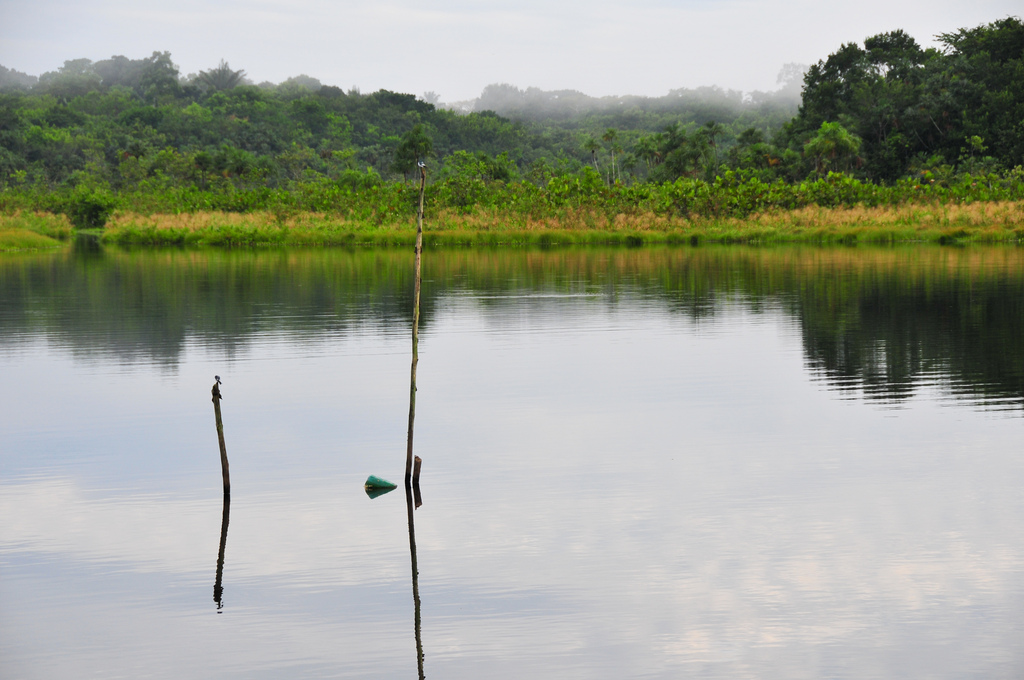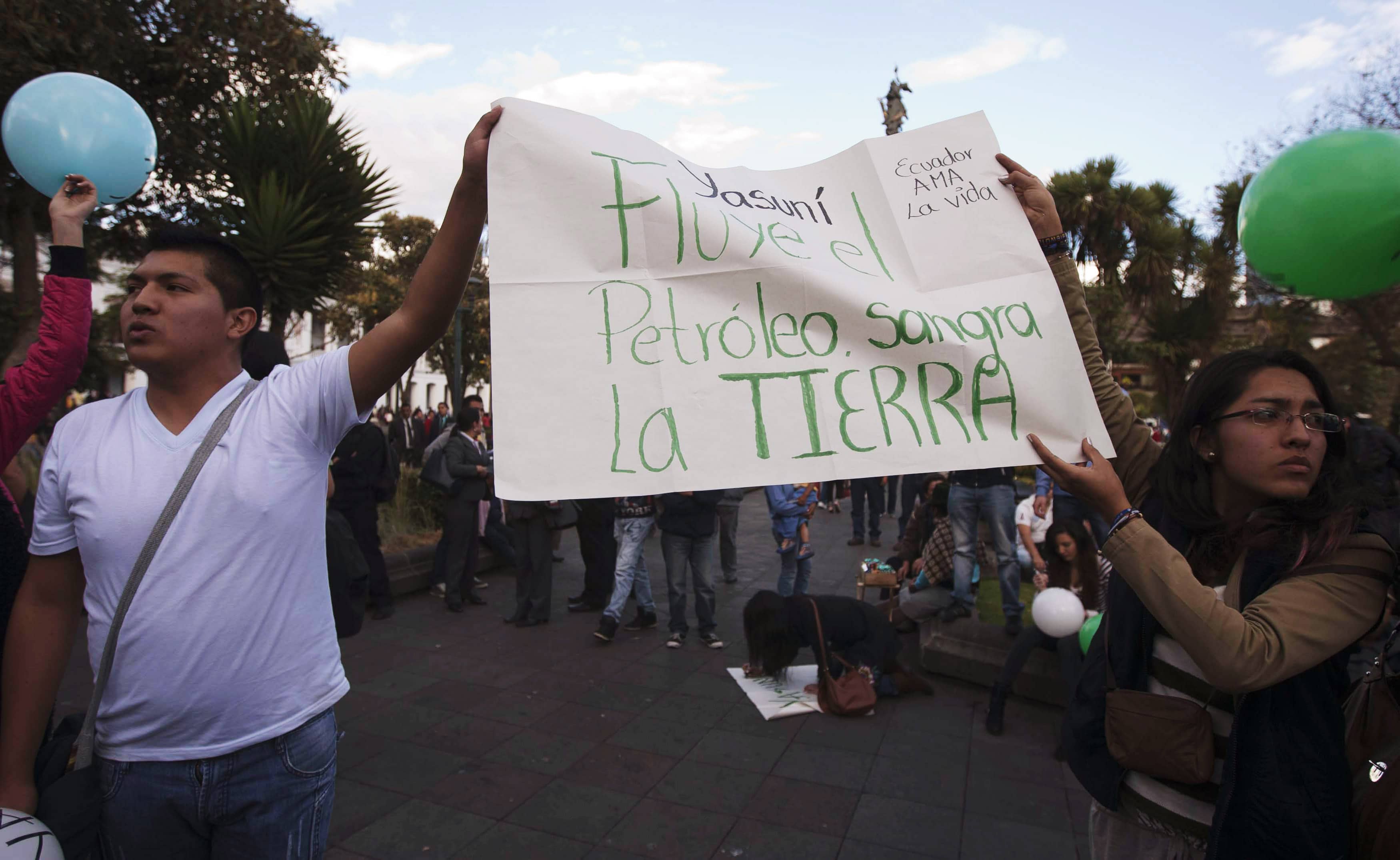Drilling will disrupt indigenous tribes and damage the environment, but Ecuador's repressive policies toward the media and civil society are preventing an open debate.
By Ashley Greco-Stoner, Senior Research Assistant, Freedom on the Net
Ecuador’s government is preparing to move forward with an oil-drilling project that will disrupt the life of indigenous tribes and damage the country’s—and the world’s—ecological patrimony. Although a significant number of Ecuadorians oppose the decision, the administration’s repressive policies toward the media and civil society are preventing an open debate.
In August, President Rafael Correa announced plans to exploit the oil reserves hidden beneath the Yasuní region of the Amazon rainforest. Last month, Ecuador’s National Assembly voted to approve the project, 108 to 25. The decision to pursue oil extraction in the area marks the collapse of the 2010 UN-backed Yasuní-ITT Initiative, which would have protected the controversial land by encouraging wealthy nations to “donate” capital to Ecuador in order to facilitate the search for alternative energy sources with less human and environmental impact. After setting the bar at some $3.6 billion, Correa responded to the international community’s pledges of $116 million and actual contributions of just $13 million by declaring that “the world has failed us.”
Having abandoned conservation efforts—most of which relied on the kindness of foreign governments—Correa is invoking an exception in the country’s 2008 constitution that allows oil to be extracted from protected land in cases of national interest. In so doing, he is dismissing the objections of Ecuadorian citizens, environmentalists, human rights advocates, and biologists, who point to the fact that a single hectare of Yasuní land not only contains more species of trees than all of North America combined, but is also fundamental to the well-being of the Indians who live in the area.
Ecuador is currently facing serious threats to both freedom of expression and freedom of association, which skew conversations about land use and national interest in favor of the government. For example, an executive decree issued in June requires that Ecuadorian associations register to obtain legal standing, giving the government broad authority over nongovernmental groups. Not only can it refuse an audience to organizations that have not filed the requisite paperwork, it can dismantle such groups should they “compromise public peace.” Prospective attempts at organizing those opposed to drilling in Yasuní National Park are consequently hindered by the fact that most indigenous groups are not registered, and any protest activity could be deemed a violation of the decree’s vague provision concerning public peace.
While hundreds of thousands of Ecuadorians are calling for a referendum on the proposed oil extraction project, the effort appears to be an uphill battle. A poll conducted in June showed that 66 percent of Ecuadorians were opposed to drilling, but a survey taken after Correa’s announcement placed the figure at only 32 percent. Though such discrepancies could be due to the wording of survey questions, it is worth noting that the government’s propagandist tendencies gained steam after the June poll with the passage of the controversial Organic Law on Communications, known by critics as the “Ley Morzada” (Gag Law). The legislation, which expands governmental oversight of media content and prohibits the publication of news items that have not been “verified … and contextualized,” is expected to stifle objective reporting on the drilling debate and to silence opposition voices. The law effectively grants preference to progovernment rhetoric, with failure to cover “issues of national interest” now carrying fines and criminal penalties. Media coverage of recent protests has already been met with governmental demands for redaction and will only face greater opposition after the Communications Law goes into full effect.
Ecuador’s economic needs have been touted as both incentive and excuse for extracting oil reserves from the Amazon. The Yasuní project is expected to result in profits of approximately $18.3 billion, but the funds will be accompanied by an estimated output of 400 million tons of carbon dioxide. Projects west of the protected Yasuní region have already led to widespread deforestation and water contamination—the result of exploration by both multinational and local companies with deplorable environmental records. In addition to the catastrophic contamination caused by Chevron/Texaco’s reported spillage of 18 billion gallons of toxic wastewater and 17 million gallons of crude oil, state-owned firm PetroEcuador is allegedly responsible for 1,400 oil spills between 2000 and 2008. Despite strong legal protections for the environment, the government lacks the capacity to monitor such oil extraction processes or conduct comprehensive impact studies. These weaknesses render official promises of minimal damage from the proposed Yasuní drilling project speculative at best, and brazenly negligent at worst.
This is not the first time the Amazon rainforest has been at the center of debates surrounding national interest, natural resources, and human rights. Many of Ecuador’s indigenous tribes were relocated in the 1970s so that their land could be repurposed for oil extraction. Indigenous peoples now face another round of disruptions. In January, the Kichwa tribe of Sani Isla managed to keep PetroAmazonas from invading its ancestral land, more than 15,000 hectares of which is located in Yasuní National Park. The victory, however, appears to have been isolated. Recent oil and logging projects in the Amazon have resulted in violent clashes between the Waorani and Taromenane Indians, as the extraction activity has pushed affected groups into territories controlled by rival clans, sparking deadly conflicts. A long-term oil extraction project in the region would almost certainly exacerbate such violence by upsetting the delicate balance of resources and territory that facilitates indigenous life.
Ecuador appeared to embrace indigenous rights ideals in 1998 by ratifying the International Labour Organization’s Convention 169, which recognizes that the identities of indigenous peoples hinge in part on living “in historical continuity in a certain [geographic] area.” The International Labour Organization and the United Nations each require special measures for the protection of such peoples, extending to “prior consultation” as well as “informed participation in policy and development processes that affect them.” Extracting oil from Yasuní National Park is unquestionably a policy that would affect indigenous populations, yet they have not been consulted.
Any dialogue would be complicated by the fact that at least two tribes, the Tagaeri and the Taromenane, are living in voluntary isolation, a facet of the communities’ identities recognized by the Ecuadorian government in 1956. But the rights of these groups must be considered carefully so that appropriate protocols can be established. The degradation of one of the most biologically diverse spots on the planet threatens not only the continued existence of these tribes and their way of life, but also the survival of innumerable rare species, and Ecuador’s natural heritage. Although billions of dollars in revenue have been promised to justify such dangers, past drilling in other areas of the Amazon has done little to alleviate Ecuador’s rampant poverty.
Correa’s decision to drill in the Yasuní could have major repercussions for both human rights and ecological interests that will be felt for generations. By ignoring the arguments of voters, biologists, anthropologists, and others, the Ecuadorian government is setting a dangerous precedent for nullification of protected land for economic gain, exhaustion of nonrenewable natural resources, and infringement on the rights of the indigenous peoples who call the Amazon basin home. Such destructive misrule is all but inevitable when democratic fundamentals like freedom of expression and association are abridged and official missteps are permitted to go unchallenged.

Yasuní National ParkJoshua Bousel/Flickr



